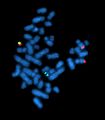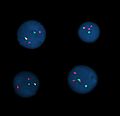Cytogenetics facts for kids
Cytogenetics is a special part of genetics that looks closely at the tiny structures inside our cells. It helps us understand how our bodies are built and how they work, especially focusing on something super important called chromosomes.
Contents
What is Cytogenetics?
Cytogenetics is like being a detective for our cells! It's a field of science that studies the structure and function of cells, especially their chromosomes. Chromosomes are tiny, thread-like structures found inside almost every cell in our body. They carry all our genetic information, like a secret code that tells our body how to grow and what to do.
Scientists who work in cytogenetics study how these chromosomes are organized, how they divide when new cells are made, and if there are any changes or problems with them.
Chromosomes: Our Genetic Blueprints
Imagine a huge instruction manual for building a person. That's kind of what our DNA is! Our DNA is packed very tightly into structures called chromosomes. Humans usually have 46 chromosomes, arranged in 23 pairs. One set of 23 comes from our mother, and the other set comes from our father.
Each chromosome has a specific shape and size. Cytogeneticists can even see different "bands" on chromosomes when they stain them. These bands are like unique patterns that help scientists identify each chromosome.
Karyotypes: A Chromosome Map
One of the main tools in cytogenetics is something called a karyotype. A karyotype is like a photograph of all the chromosomes from a single cell, arranged neatly in pairs from largest to smallest. It's a way to see if someone has the correct number of chromosomes and if each one looks normal.
To make a karyotype, scientists take a picture of the chromosomes during a specific part of cell division when they are most visible. Then, they cut out each chromosome image and arrange them in order. This helps them spot any missing, extra, or changed chromosomes.
Cell Division: Making New Cells
Our bodies are constantly making new cells for growth and to replace old ones. This process is called cell division. There are two main types of cell division that cytogeneticists study:
Mitosis
Mitosis is how most of our body cells divide. When a cell divides by mitosis, it makes two new cells that are exactly the same as the original cell. Each new cell gets a complete set of 46 chromosomes. This is important for growth and repairing tissues.
Meiosis
Meiosis is a special type of cell division that happens only when our bodies make sperm or egg cells. Unlike mitosis, meiosis creates cells with only half the number of chromosomes (23 in humans). When a sperm and an egg combine, they form a new cell with the full 46 chromosomes, creating a new individual.
Cytogeneticists study meiosis to understand how genetic information is passed from parents to children and to identify problems that might occur during this process.
Why is Cytogenetics Important?
Cytogenetics plays a huge role in understanding human health and evolution. Here are a few reasons why it's so important:
- Diagnosing Genetic Conditions: By looking at chromosomes, scientists can find genetic conditions like Down syndrome, which is caused by an extra copy of chromosome 21. They can also find other conditions caused by missing or rearranged parts of chromosomes.
- Understanding Cancer: Many types of cancer are linked to changes in chromosomes. Cytogeneticists can identify these changes, which helps doctors understand the cancer better and choose the best treatments. For example, a specific change between chromosome 9 and 22 is often seen in a type of blood cancer called chronic myelogenous leukemia (CML).
- Studying Evolution: Cytogenetic studies can also help us understand how different species have changed over time. By comparing the chromosomes of different animals, scientists can see how closely related they are and how their genetic material has evolved.
In short, cytogenetics helps us understand the fundamental building blocks of life and how they can affect our health and development.
Images for kids
See also
 In Spanish: Citogenética para niños
In Spanish: Citogenética para niños





